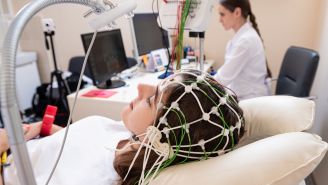7 Science-Backed Ways to Keep Your Memory Strong
It’s not too late to start doing these mind-preserving tricks.

We all forget things from time to time. Where did I put those car keys? What did I need from the store again? Forgetfulness is a normal part of aging, but it’s not time to worry about dementia or mild cognitive impairment every time you can’t remember why you walked into a room. What’s more, there are a number of things you can do to keep your memory working well into old age. Here’s the science behind keeping your memory sharp.

Read a book
Reading isn’t just a great way to unwind after a long day. A 2013 study published in Neurology suggests that bookworms have less of a risk of late-life cognitive decline than people who don’t challenge their minds with books. The study looked at the brains of nearly 300 people older than 55 who had done cognitive tests for an average of six years and then died. It found that those who engaged in enriching activities—including reading, going to the library and writing letters—had less cognitive decline than those who did not. The best part? You can start now and reap the benefits later; the study suggests that these activities in childhood and middle age helped offset age-related memory trouble down the road.

Pound the pavement
Moving more is good for your waistline. It’s also associated with a healthier brain. A 2010 Neurology study asked 300 people age 65 and older how many blocks they walked in a week, and then scanned their brains nine years later. Those who walked at least 72 blocks—or between six and nine miles—per week had more grey matter in their brains than people who walked less, and they had a 50 percent lower risk of cognitive impairment or dementia. Grey matter is made up of brain cells, and is thought to shrink with age, potentially putting people at risk for brain conditions like Alzheimer’s disease and mild cognitive impairment.

Be mindful
Mindfulness can reduce stress and promote resilience, but it can also help your hippocampus. The hippocampus is one of the sections of the brain that’s necessary for storing new memories, researchers believe. A small 2010 study in Psychiatry Research found weekly group mindfulness training increased grey matter volume in the left hippocampus. Another study, this one from 2013 and published in Psychological Science, found that two weeks of mindfulness training improved memory, reading comprehension and focus on a standardized test.

Do some good
Be generous with your time. Not only can it help beat stress and lower blood pressure, regular volunteering is associated with a lower risk of cognitive impairment. It may be because it promotes physical, social and brain activity. A large study followed more than 13,200 people aged 60 and older between 1998 and 2012. People were asked if they’d volunteered in the 12 months prior to the start of the study, then given a short test of mental abilities, including memory. The people who never volunteered had the highest rate of cognitive decline in 2012, while the people who never volunteered after 1998 had the second highest. Those who started or continued volunteering after the start of the study cut their risk considerably, and the more a person volunteered, the lower their risk for cognitive decline.

Learn something new
You may not think of quilting or photography as being memory enhancers, but according to a 2013 Psychological Science study, that’s just what they are. The 259 participants in this study were broken into three groups. The first engaged in what the researchers called high cognitive demand conditions: they learned to quilt, learned digital photography or learned both, for 16 hours a week for three months. The second group performed low demand cognitive tasks on their own, and the third spent time being social. At the end of the study, the group doing the high demand tasks out-performed the other two groups on cognitive tests.

Make something beautiful (or even not so beautiful)
Famous painter Pablo Picasso once said, “The purpose of art is washing the dust of daily life off our souls.” He didn’t mention knocking the cobwebs from our minds, but art can help your memory and help stave off dementia and mild cognitive impairment. A 2015 Neurology study asked 256 elderly people about their participation in arts, crafts, social activity and computer use, and tracked them for four years to see if they developed memory problems. It found that people who engaged in the arts in both middle and old age were 73 percent less likely to develop mild cognitive impairment than people who never engaged in art.

Fight the pain
Nobody likes to live with pain. Chronic pain has been shown in studies to negatively affect blood pressure, mental health, sleep and sexual function. Add memory to that list. A 2017 study in JAMA Internal Medicine tracked more than 10,000 people from 2000 to 2012. It found that for people experiencing persistent moderate or severe pain, their memory declined nearly 10 percent faster than those without persistent pain, and their risk of dementia rose almost 8 percent faster. While opioid medications work well on a short-term basis for acute pain, for chronic pain they shouldn’t be the first option or used routinely. Try these opioid-free ways to feel better instead.
More On


video

article

slideshow


video


video
